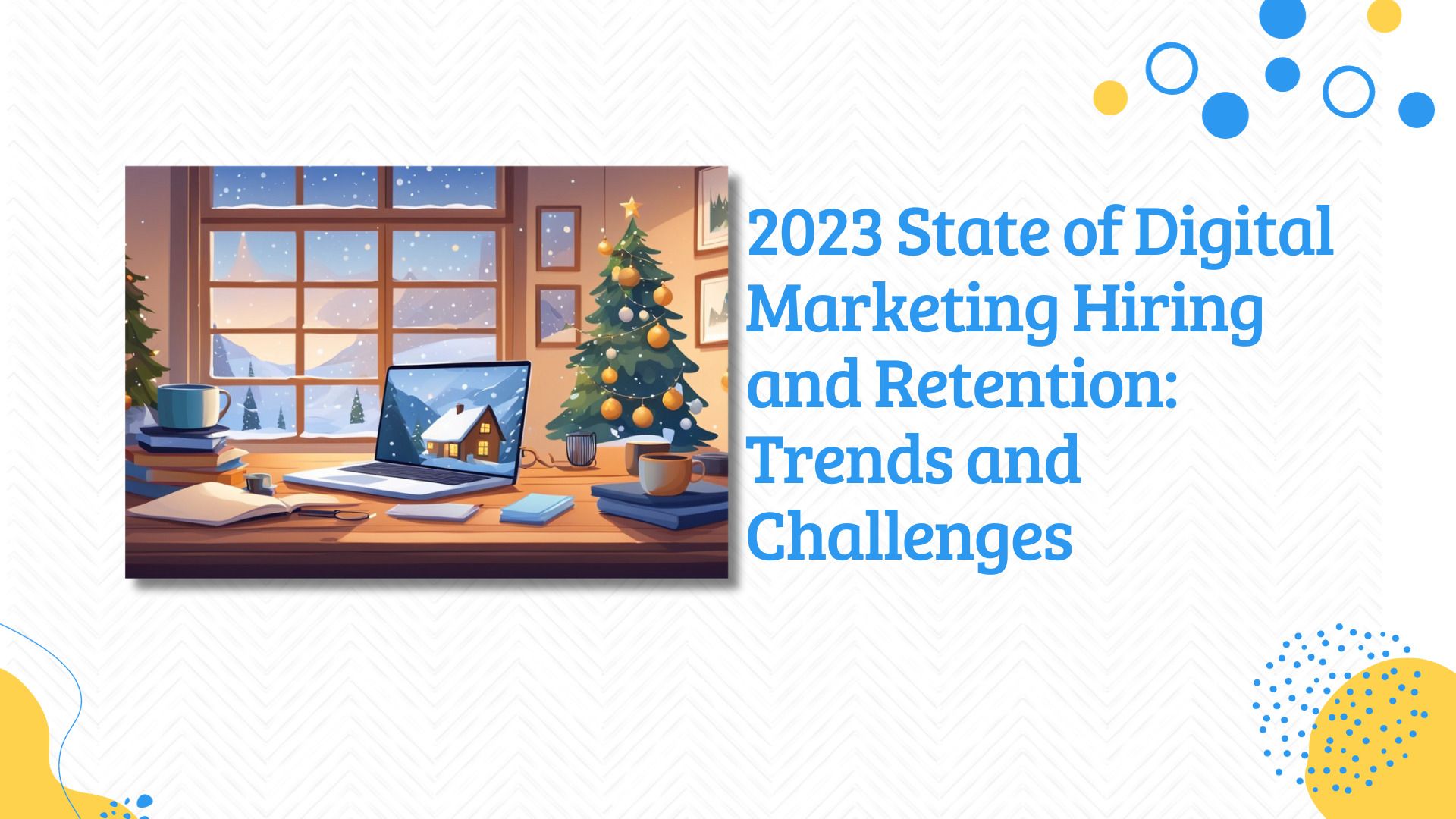As digital marketing continues to evolve, it has brought with it new challenges and opportunities in the realm of hiring and retention within the industry. The rapidly changing digital landscape necessitates a dynamic workforce, skilled in the latest marketing technologies and strategies. With an increased focus on hybrid pricing models, agencies are adapting their services and, consequently, their staffing requirements to meet the burgeoning demand in areas such as social ads, which has become a widely offered service by digital marketing agencies.
The hiring trends in the digital marketing sector are a reflection of the industry’s growth and the continuous need for innovation. The competition for top talent has intensified, prompting marketing hiring managers to reevaluate their strategies. They confront the task of not only attracting but also retaining skilled professionals who can navigate the complexities of SEO, content creation, PPC, and other essential components of a successful digital marketing campaign.
Retention strategies are becoming as important as hiring practices. To address this, agencies are investing in new tools and technologies to stay ahead of the curve. This investment not only serves clients better but also plays a crucial role in employee satisfaction and professional growth. By equipping staff with advanced resources, agencies create a stimulating work environment that encourages development and fosters loyalty, thereby supporting a stable and proficient digital marketing workforce.
State of the Digital Marketing Workforce
The digital marketing industry continues to adapt in the wake of the pandemic, with a significant shift in work practices and a strong emphasis on branding and company culture to attract top talent.
Impact of COVID-19 on Work Practices
The pandemic has irrevocably altered work practices within the digital marketing industry. A surge in remote work options and hybrid work models has become the new norm. Companies offering flexible working arrangements are now more appealing to job seekers, with remote work often being a decisive factor in employment decisions.
Evolving Trends in Hiring and Recruitment
Hiring trends in digital marketing are evolving, with an increased need for professionals adept at navigating the digital space. Recruitment strategies have shifted towards finding talent with multifaceted skills. Hiring managers are emphasizing the importance of strong analytical and digital competencies in prospective employees.
The Rise of Gen Z in Digital Marketing
Gen Z is entering the digital marketing workforce with distinct career goals and values, including a desire for authentic employer engagement and brands that take a stand on social issues. They are looking for positions that are not only career-oriented but also align with their personal values.
Importance of Employer Branding
Employer branding has become pivotal in retaining and attracting talent in the digital marketing field. A strong employer brand that showcases a supportive company culture and growth opportunities can significantly improve a company’s appeal to potential candidates.
Diversity and Inclusion Initiatives
Diversity and inclusion have taken center stage, with the industry recognizing the need to create inclusive work environments that respect and celebrate differences. Companies are actively developing policies that foster diversity and inclusion to build stronger, more innovative teams.
Recruitment Strategies
The landscape of hiring within digital marketing has evolved, requiring recruiters to adapt by implementing innovative strategies. Effective recruitment now involves advanced digital tools, clear communication, strategic creation of candidate pools, transparency in compensation, and a focus on professional growth for retention.
Leveraging Digital Tools and Platforms
Recruiters have to navigate a multitude of digital platforms to attract top candidates. They are increasingly relying on specialized software for recruitment marketing, such as SEO and social media analytics, to reach a broader audience. Utilizing these digital tools can help pinpoint in-demand talent by aligning with their search behaviors and preferred online habitats.
Effective Communication with Job Seekers
Clear and responsive communication sets the tone for a candidate’s experience. Companies that engage promptly and effectively with job seekers stand out by establishing a reputation for respect and professionalism. Implementing systems like chatbots that provide immediate answers and personalized email campaigns can enhance the recruitment process.
Building Competitive Candidate Pools
Candidate pools are essential for quick and effective hiring. Recruiters should consistently gather and engage with a network of qualified individuals. Maintaining an active pool allows companies to swiftly fill vacancies with top candidates, reducing downtime and increasing productivity.
Utilizing Salary Transparency as a Tool
Salary transparency is no longer taboo but a tool to build trust. Disclosing compensation details upfront can filter applicants to those who are genuinely interested. Current digital marketing salary trends can guide companies in setting competitive rates, which should be communicated clearly in job listings.
Retention Through Career Development
Post-hire strategies are equally critical. Offering clear paths for career development and growth can boost employee retention. Investing in current employees through training and advancement opportunities not only improves skill sets but also reinforces the company’s commitment to its workforce.
Hiring Trends and Salary Insights
The digitization of marketing has significantly altered both the talent landscape and compensation benchmarks. As organizations continue to prioritize online presence, they seek skilled talent proficient in the latest digital marketing tools and strategies. Coupled with the Great Resignation, understanding these shifts is crucial for recruitment and retention.
Understanding the Talent Landscape
Talent shortages have become a formidable challenge. Marketing and creative fields are experiencing a high demand for specialized skills that are not readily available in the current job market. To combat this, companies are seeking not just candidates with the right skill set but also those willing to continuously learn and adapt. It’s essential for employers to recognize the pivotal role of employee experience in retention and recruitment strategies during ongoing talent shortages.
Benchmark Data on Digital Marketing Salaries
Salaries in digital marketing have seen notable changes, reflecting the high demand for skilled professionals in the field. Exclusive salary range benchmark data indicates that competitive compensation packages are now a necessity for attracting and acquiring the right talent. The requirements vary widely across different roles, from content creation to analytics, and companies must stay well-informed of these benchmarks to maintain an edge.
Adapting to Change: The Great Resignation
It remains a candidate-driven job market; the phenomena widely known as the Great Resignation has provided employees with leverage to seek out roles that not only offer competitive salaries but also align with their values and work-life balance preferences. Employers are responding by revising their retention strategies, focusing on more than just salary—workplace flexibility, career development opportunities, and company culture have become equally important.
Retention and Growth Strategies
In 2023, digital marketing agencies face the dual challenge of retaining skilled employees and cultivating a workforce agile enough to thrive in a rapidly evolving industry. Here’s how industry leaders are addressing these challenges.
Fostering a Culture of Upskilling
Agencies prioritize upskilling their teams to keep pace with digital marketing innovations. Investment in ongoing training allows employees to align their personal career goals with the company’s growth trajectory. By promoting talent development, they are more likely to retain top talent who value personal growth and contribution to the company’s success.
Developing a Robust Retention Strategy
A retention strategy goes beyond traditional perks. Businesses are establishing clear career paths and latticing opportunities to satisfy the professional growth appetite of ambitious employees. Regular feedback loops and a focus on a supportive work environment have become foundational pillars for employee retention.
Aligning Compensation with Growth Goals
Compensation strategies are now closely tied to clear growth goals. Digital marketing firms are restructuring pay scales and bonus systems to reward achievement and initiative. This realignment assists businesses in not only attracting but also maintaining the industry’s top talent, ensuring that key players remain motivated and engaged with the company’s success.
Marketing Channels and Content Strategy

In today’s digital landscape, businesses keen on attracting and retaining top marketing talent need to focus on robust content strategies across a variety of channels, considering the integration of SEO, social media outreach, and innovative content delivery methods.
Maximizing Social Media and SEO
Businesses optimize their presence on platforms such as Instagram or LinkedIn, recognizing that social media channels serve as both a discovery and engagement tool. SEO complements these efforts by increasing visibility and driving targeted traffic to their content. Employers emphasize the need for digital marketing professionals who can adeptly balance the technical aspects of SEO with the creative demands of social media.
Innovating with Email Marketing and Blogs
The evolution of email marketing strategy remains vital, blending personalization with data-driven insights. Organizations leverage email marketing and blogs to maintain a direct line of communication with their audiences, distributing content that educates and nurtures leads. Blogs remain a cornerstone for content strategies, offering a platform for thought leadership and driving organic search traffic through SEO-friendly content.
The Role of Podcasts in Brand Building
Podcasts have emerged as a key component for brand building, representing a medium where companies can express their brand’s voice and values in a more intimate format. They are instrumental for employers aiming to showcase their industry expertise and corporate culture, which in turn can attract marketing talent aligned with their brand’s ethos.
Data-Driven Marketing and Analytics

In the rapidly evolving landscape of digital marketing, data-driven strategies have become pivotal. Analytics now inform decisions not only in campaign management but also in hiring and retention of marketing professionals.
Utilizing Analytics for Better Hiring Decisions
Hiring managers are increasingly leveraging analytics to make informed recruitment choices. By analyzing hiring trend research, they can identify the skills most necessary for current and future marketing challenges. With a data-centric approach, companies can pinpoint candidates who not only possess the right expertise but also are a good fit for the company’s culture and long-term objectives, enhancing the likelihood of employee retention.
Reporting Tools to Track and Improve Retention
Employee retention hinges on the ability to understand and react to workforce dynamics. The implementation of reporting tools offers a transparent view of employee performance, satisfaction, and engagement. By meticulously tracking these metrics, businesses can proactively address issues, leading to improved retention rates.
Analytics play a role here by signposting patterns and predicting trends that might affect turnover. As such, these tools not only help retain talent but also shape better hiring practices by providing data on the type of candidates who thrive within the company.
Ebooks and Resources for Hiring Managers
A wealth of ebooks and resources are available for hiring managers seeking to adopt a more data-driven approach. These resources typically cover the latest in digital marketing competencies and methodologies, providing actionable insights into recruitment processes. Armed with this knowledge, hiring managers can formulate strategies that align with industry standards and innovations, equipping them to hire marketers who can drive business growth through adept use of data analytics.
Pay-Per-Click (PPC) and Advertising Talent Acquisition
The digital marketing landscape is seeing a heightened demand for skilled professionals in Pay-Per-Click advertising. Companies are strategizing to recruit individuals adept at maneuvering the complexities of PPC campaigns to secure a competitive edge.

Demand for PPC Skills in Job Seekers
The quest for in-demand talent in the realm of PPC is intensifying as businesses vie for the top candidates. These job seekers should exhibit proficiency in keyword research, campaign analysis, conversion optimization, and be well-versed with current PPC trends, such as voice search affecting PPC. They should also demonstrate the ability to adapt to new platforms and changing algorithms to maintain effective advertising campaigns.
- Key Competencies:
- Strategic keyword selection
- Campaign performance analysis
- Familiarity with recent PPC innovations
- Adaptability to platform updates
Advertising Talent and Digital Marketing Integration
Talent acquisition in advertising goes beyond understanding traditional PPC metrics. The crux lies in the integration of advertising expertise with broader digital marketing teams. Candidates should not only bring individual PPC campaign excellence but also have the capability to weave these strategies into larger digital marketing initiatives. Such advertising talent thrives when they can collaborate, share insights, and drive omnichannel marketing efforts that leverage PPC as a fundamental component.
- Integrative Skills:
- Cross-functional collaboration
- Omnichannel marketing strategy
- Data-driven decision making
Firms are diligently searching for individuals who can transcend singular campaign management and contribute to the company’s overarching advertising and marketing goals. This commitment to hiring individuals who embody both PPC acumen and digital marketing savvy is pivotal in nurturing robust, resilient marketing operations.
Advancing Digital Marketing Careers
Digital marketing professionals have various avenues to enhance their career prospects. Through deliberate utilization of resources and setting clear professional milestones, marketers can strategically position themselves for advancement.
Utilizing Resources to Advance Your Career
Skill development is crucial in staying relevant in the ever-evolving digital marketing landscape. Professionals should seek out educational materials, whether through online courses, webinars, or industry publications. For instance, mastering tools such as Hootsuite, HubSpot, Buffer, and SproutSocial can significantly bolster a marketing manager’s capabilities. Focusing on both technical skills and soft skills—like communication and strategic thinking—can significantly enhance the employee experience and make one a more valuable team member.
Leveraging networks like LinkedIn for knowledge sharing and networking provides access to insights about career development opportunities and emerging trends. Digital marketing professionals can connect with peers and engage with thought leaders to further enrich their skill development and career trajectory.
Setting and Achieving Professional Milestones
It’s crucial for marketing professionals to outline clear career goals—both short-term and long-term. They should define what advancement looks like, be it stepping into a leadership role or becoming a specialist in a niche area such as SEO or social media.
Professionals aiming to become top talent in their field must not only set these milestones but also create actionable steps to achieve them. This may involve seeking mentorship, aiming for certifications, or working on high-impact projects that can showcase their abilities. An analytical approach to measuring progress towards these goals allows for adjustments and keeps one’s career on an upward trajectory.
By following these strategies, digital marketing professionals can effectively advance their careers, ensuring they stay competitive and fulfilled in their roles.
Conducting Digital Marketing Research
Conducting thorough digital marketing research is paramount for companies to stay ahead in a competitive market. It informs hiring strategies and content direction, ensuring that efforts align with industry trends and audience needs.
Importance of Ongoing Market Research
Ongoing market research is vital for digital marketing agencies to thrive. It involves continuously analyzing data to understand industry trends, which can significantly affect hiring strategies. By staying informed, companies can adapt and source talent like SEO specialists to address emerging digital channels and consumer behaviors. They focus on hiring trend research to gauge what competencies are in demand, avoiding skill gaps within their team that could hinder their adaptability in the rapidly evolving digital landscape.
- Key Benefits of Market Research:
- Informs recruitment of specialized roles.
- Identifies shifts in consumer preferences.
- Helps anticipate future industry changes.
Creating Informative and Educational Content
The creation of informative and educational content, such as blogs and ebooks, establishes a digital marketing firm as a thought leader. This content should leverage research to address both current and future industry needs, thereby attracting top talent and informed clients. Agencies develop a content strategy that educates their audience, from clients to potential hires, underlining the value and foresight the agency possesses when it comes to digital marketing trends.
- Components of Effective Content:
- Data-driven insights: Integrates findings from market research.
- Actionable advice: Offers practical tips aligned with current research.
- Future projections: Analyzes trends to forecast industry movements.
Producing such content demonstrates an agency’s commitment to being at the forefront of digital marketing innovation, which is not only beneficial for client relationships but also makes the agency attractive to the best candidates in the field.
Frequently Asked Questions
This section addresses common inquiries regarding the current trends in digital hiring and retention within the digital marketing sphere.
What qualities are top-performing digital marketers expected to possess?
Top-performing digital marketers need to be adept in data analysis, SEO, and content marketing. They must also maintain a strong proficiency in evolving technologies and platforms to ensure that strategies remain relevant.
How has the digital marketing job landscape changed in terms of desired degrees or certifications?
The digital marketing landscape now values a mix of formal education and industry certifications. Employers are looking for candidates with certifications in Google Analytics, Facebook Blueprint, and a solid understanding of digital marketing tools and software.
What are emerging interview practices being adopted for digital marketing roles this year?
Interview practices for digital marketing roles have evolved to include live exercises assessing strategic thinking and tactical execution. Candidates may be asked to draft a sample campaign or analyze data in real-time to demonstrate their capabilities.
How are companies adapting their employer branding to attract digital marketing talent?
Companies are highlighting flexible working arrangements, inclusive cultures, and opportunities for professional development, aligning their employer branding with the values and expectations of tech-savvy digital marketing professionals.
In what ways is the value of starting a digital marketing agency evaluated currently?
The value of starting a digital marketing agency is assessed based on niche specialization, the agency’s ability to adapt to digital trends, and scalability. Experts also examine the recurring revenue model and client retention rates.
What are the key elements to include in a successful digital marketing strategy this year?
A successful digital marketing strategy this year should include personalized content, a robust mobile marketing approach, and significant investment in video marketing. Effectively utilizing customer data to drive strategy is also essential.
